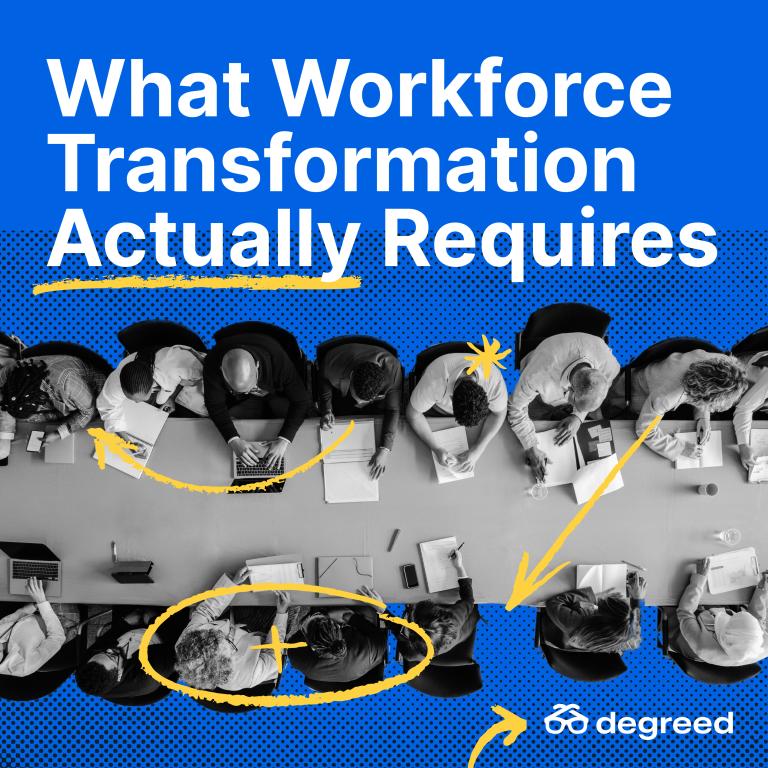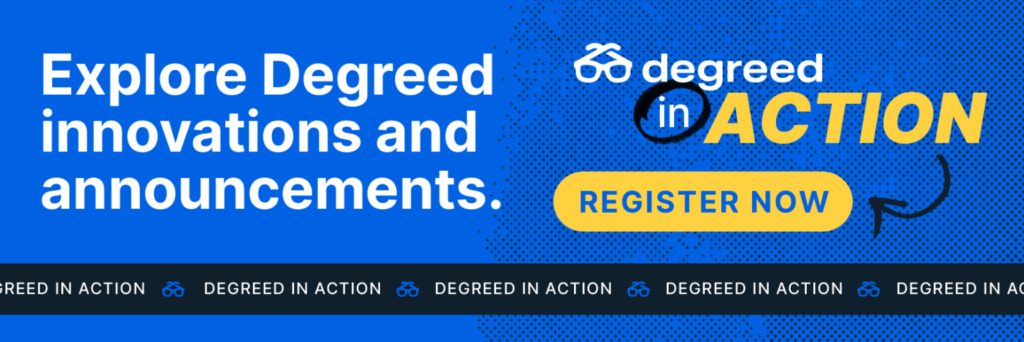
What Workforce Transformation Actually Requires
As artificial intelligence reshapes how work gets done, it probably seems like the skills your workforce needs are evolving faster than traditional job architectures. Globally, employee learning is struggling to keep pace.
As the gap between business needs and workforce capabilities persists, people need more control over how they develop. The knowledge they pursue needs to be hyper relevant.
Moving your people from Point A to Point Z in today’s world of work is more than a project. It’s bigger than a pilot. And that’s why workforce transformation is more than a buzzword.
We think about workforce transformation as changing your company’s structure and skills—to align your people with business strategy. Done well, it can have a profound effect on their ability to perform at their best.

The Importance of Shared Leadership
Like many other worthy business endeavors, workforce transformation requires collaboration among HR, Learning, and IT leadership.
Some organizations have created dedicated roles to lead the charge: Organization & Transformation Officer, Development & Change Management Lead, and Vice President of Workforce Planning, among other titles.
Innovative leaders know that transformation isn’t about repackaging L&D. It’s not about more training. It’s not even just about reskilling.
Structuring for Change
To keep pace with shifting demands, successful organizations are rethinking how they build, organize, and support talent at scale.
These organizations are:
- Establishing a language for skills that’s consistent and organization-wide.
- Identifying skill gaps through accurate, connected data.
- Helping employees adapt to new ways of working.
- Delivering personalized, business-aligned development at scale.
- Measuring whether skills are actually being built—and where.
These actions represent strategic changes that affect workforce planning, promote internal mobility, advance recruiting, and grow careers. They require clear ownership and coordinated execution.
The Critical Role of the C-Suite Stakeholder
At many companies, CHROs are defining workforce strategy. CLOs are making learning more relevant and aligned. CIOs are responsible for delivering infrastructure that supports flexibility, security, and interoperability.
None of this comes together in isolation. That’s why leading organizations are aligning their people systems and strategy around a shared foundation: skills.
Creating a Common Skills Language Across the Business
One of the biggest blockers to transformation is inconsistent skill data. Different systems define and track skills in different ways—or not at all. The result is duplicate effort and unclear decision-making.
Clarity is key. That’s why Degreed Skills+ eliminates roadblocks by integrating skill data from across your HRIS, LXP, LMS, and talent marketplace—and then cleaning, normalizing, and organizing it using AI. It suggests and resolves synonyms, defines proficiency levels, and enables customization based on your unique organizational language.
With a shared skills framework, your cross-functional teams can finally work from the same data and unify how skills are defined and tracked—so you can identify gaps, measure progress, and plan with confidence.
Delivering Personalized, Scalable Growth
Once skill gaps are identified, the next big step is delivering meaningful development.
What makes learning meaningful? Relevance. With Degreed Learning, content, mentors, and pathways are tailored to each employee’s role, goals, and skill profile. Instead of navigating overwhelming content libraries, learners are guided toward what they need when they need it. Further personalizing the experience, Degreed Automations handles assignments, updates, and nudges automatically—triggered by employee actions or milestones.
And to make employee development even more adaptive, Degreed Maestro, our AI purpose-built for learning, uses role, context, and historical data to recommend content, coach employees, and assess progress. It reduces wasted time, boosts platform engagement, and improves learning retention.
Supporting Change as Your Strategy Unfolds
Transformation doesn’t end at go-live. As priorities evolve, systems need to support continuous adaptation.
As your organization adopts new technologies, embraces internal mobility, or rethinks how teams are structured, employees need to understand what’s changing—and how to keep up.
Degreed supports change readiness with features like skill-level descriptions, coaching, and role-specific Learning Plans and Pathways. Employees can see where they stand, what to focus on next, and how to grow into evolving roles.
What Leading Teams Are Doing Differently
What sets successful teams apart is not only vision, but also execution.
Forward-thinking organizations are:
- Standardizing skill definitions across teams and systems.
- Prioritizing development aligned with business needs.
- Reducing friction in how people access and apply learning.
- Measuring progress in terms of actual skill growth.
- Using real-time data to make decisions about talent development and deployment.
A system like Degreed connects the dots across these workflows, reducing manual effort and creating visibility across functions—without adding complexity.
What comes next depends on the steps you take now.
Preparing for AI. Improving retention. Boosting employee performance. Whatever the goal, the pressure to adapt is no longer theoretical—it’s operational.
With tools like Degreed Skills+, Degreed Learning, and Degreed Maestro, you can define the skills that matter, develop them with purpose, and track progress with clarity. That’s how transformation becomes operational—and sustainable.
Learn more.
Get a clear picture of what’s coming from Degreed. Check out our seven-part Degreed in Action webinar series and choose your sessions to find out more about our innovations in AI, skills reporting, automations, Degreed Professional Services, Degreed Academies, and more.

Restons en contact 
Je souhaite m’inscrire à la newsletter mensuelle pour me tenir informé(e) des prochains événements, bénéficier d’éclairages exclusifs et recevoir l’actualité des solutions Degreed.
Nous prenons très au sérieux la protection de votre vie privée. Vous pouvez modifier vos préférences en matière d’e-mail ou vous désabonner à tout moment. Conformément à vos préférences, les informations que vous nous avez fournies seront utilisées uniquement pour vous envoyer des communications relatives à Degreed. Pour en savoir plus, consultez la Politique de confidentialité de Degreed.